逐句精讲新概念英语第二册第49课美梦告终
- 格式:doc
- 大小:31.50 KB
- 文档页数:3
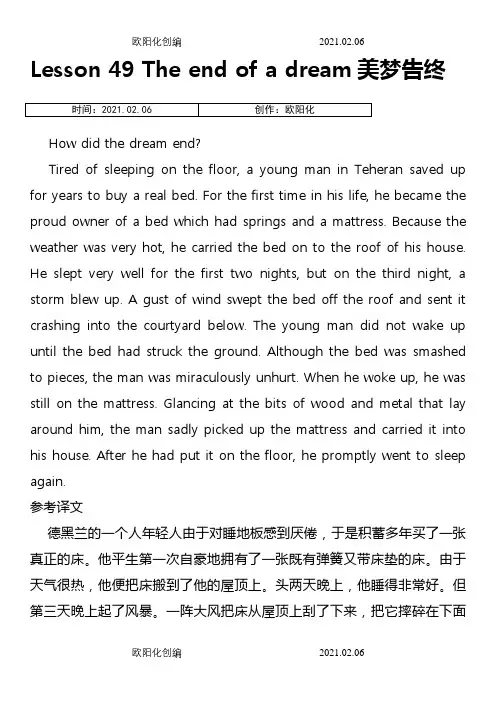
Lesson 49 The end of a dream美梦告终How did the dream end?Tired of sleeping on the floor, a young man in Teheran saved up for years to buy a real bed. For the first time in his life, he became the proud owner of a bed which had springs and a mattress. Because the weather was very hot, he carried the bed on to the roof of his house. He slept very well for the first two nights, but on the third night, a storm blew up. A gust of wind swept the bed off the roof and sent it crashing into the courtyard below. The young man did not wake up until the bed had struck the ground. Although the bed was smashed to pieces, the man was miraculously unhurt. When he woke up, he was still on the mattress. Glancing at the bits of wood and metal that lay around him, the man sadly picked up the mattress and carried it into his house. After he had put it on the floor, he promptly went to sleep again.参考译文德黑兰的一个人年轻人由于对睡地板感到厌倦,于是积蓄多年买了一张真正的床。

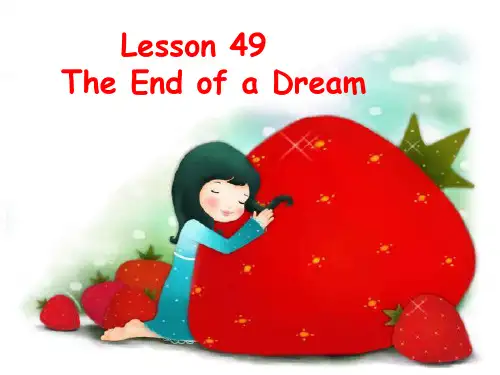
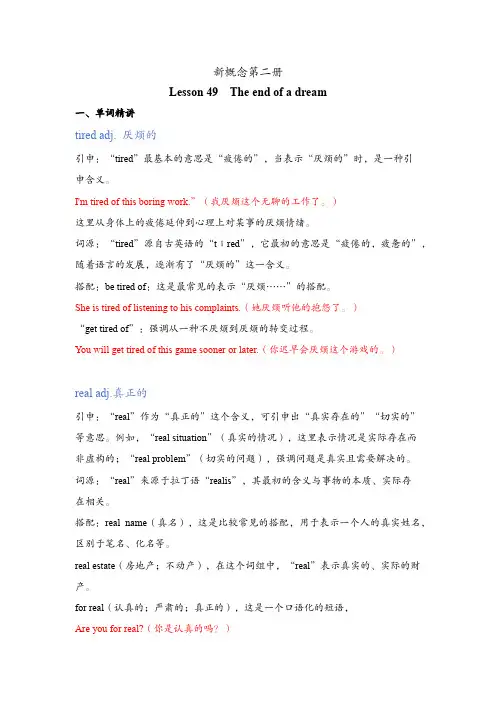
新概念第二册Lesson 49 The end of a dream一、单词精讲tired adj. 厌烦的引申:“tired”最基本的意思是“疲倦的”,当表示“厌烦的”时,是一种引申含义。
I'm tired of this boring work.”(我厌烦这个无聊的工作了。
)这里从身体上的疲倦延伸到心理上对某事的厌烦情绪。
词源:“tired”源自古英语的“tīred”,它最初的意思是“疲倦的,疲惫的”,随着语言的发展,逐渐有了“厌烦的”这一含义。
搭配:be tired of:这是最常见的表示“厌烦……”的搭配。
She is tired of listening to his complaints.(她厌烦听他的抱怨了。
)“get tired of”:强调从一种不厌烦到厌烦的转变过程。
You will get tired of this game sooner or later.(你迟早会厌烦这个游戏的。
)real adj.真正的引申:“real”作为“真正的”这个含义,可引申出“真实存在的”“切实的”等意思。
例如,“real situation”(真实的情况),这里表示情况是实际存在而非虚构的;“real problem”(切实的问题),强调问题是真实且需要解决的。
词源:“real”来源于拉丁语“realis”,其最初的含义与事物的本质、实际存在相关。
搭配:real name(真名),这是比较常见的搭配,用于表示一个人的真实姓名,区别于笔名、化名等。
real estate(房地产;不动产),在这个词组中,“real”表示真实的、实际的财产。
for real(认真的;严肃的;真正的),这是一个口语化的短语,Are you for real?(你是认真的吗?)owner n. 主人引申:“owner”作为“主人”,可引申为拥有者、所有者,在很多情况下表示对某个事物具有所有权的人或主体。
例如在商业语境下,“the owner of a company”(公司的所有者),这里的“owner”不仅是公司的主人,还拥有对公司的各种权益。
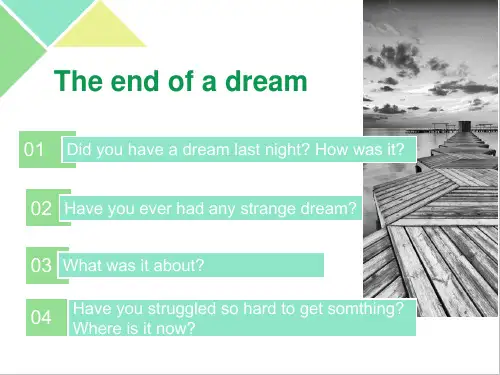
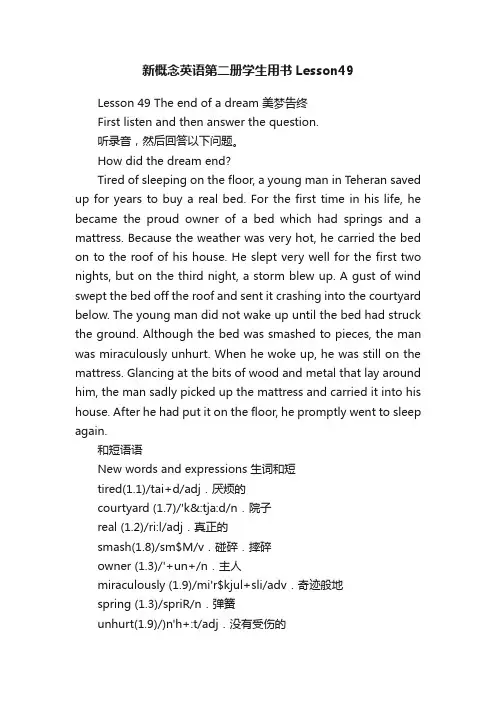
新概念英语第二册学生用书Lesson49Lesson 49 The end of a dream 美梦告终First listen and then answer the question.听录音,然后回答以下问题。
How did the dream end?Tired of sleeping on the floor, a young man in Teheran saved up for years to buy a real bed. For the first time in his life, he became the proud owner of a bed which had springs and a mattress. Because the weather was very hot, he carried the bed on to the roof of his house. He slept very well for the first two nights, but on the third night, a storm blew up. A gust of wind swept the bed off the roof and sent it crashing into the courtyard below. The young man did not wake up until the bed had struck the ground. Although the bed was smashed to pieces, the man was miraculously unhurt. When he woke up, he was still on the mattress. Glancing at the bits of wood and metal that lay around him, the man sadly picked up the mattress and carried it into his house. After he had put it on the floor, he promptly went to sleep again.和短语语New words and expressions 生词和短tired(1.1)/tai+d/adj.厌烦的courtyard (1.7)/'k&:tja:d/n.院子real (1.2)/ri:l/adj.真正的smash(1.8)/sm$M/v.碰碎.摔碎owner (1.3)/'+un+/n.主人miraculously (1.9)/mi'r$kjul+sli/adv.奇迹般地spring (1.3)/spriR/n.弹簧unhurt(1.9)/)n'h+:t/adj.没有受伤的mattress (1.3)/'m$tr+s/n.床垫glance(1.9)/gla:ns/v.扫视gust(1.6)/g)st/n.一阵风promptly(1.11)/'pr&mptli/adv.迅速地sweep(1.6)/swi:p/(swept/swept/,swept)v.扫,刮文注释释Notes on the text 课文注1 Tired of sleeping on the floor, 由于对睡地板感到厌倦。
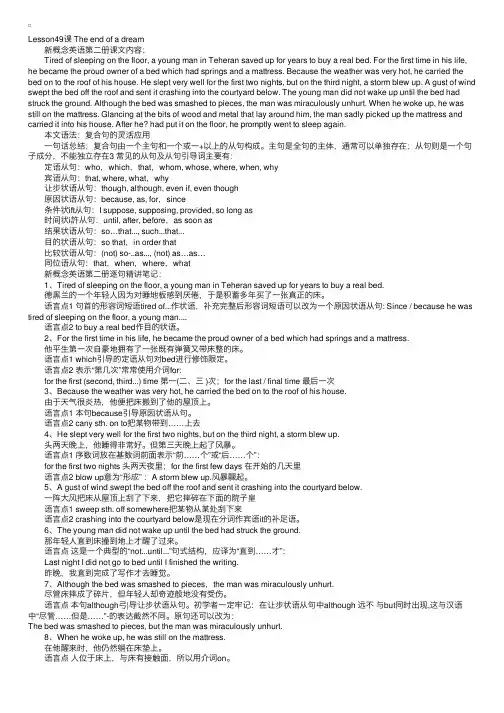
Lesson49课 The end of a dream 新概念英语第⼆册课⽂内容: Tired of sleeping on the floor, a young man in Teheran saved up for years to buy a real bed. For the first time in his life, he became the proud owner of a bed which had springs and a mattress. Because the weather was very hot, he carried the bed on to the roof of his house. He slept very well for the first two nights, but on the third night, a storm blew up. A gust of wind swept the bed off the roof and sent it crashing into the courtyard below. The young man did not wake up until the bed had struck the ground. Although the bed was smashed to pieces, the man was miraculously unhurt. When he woke up, he was still on the mattress. Glancing at the bits of wood and metal that lay around him, the man sadly picked up the mattress and carried it into his house. After he? had put it on the floor, he promptly went to sleep again. 本⽂语法:复合句的灵活应⽤ ⼀句话总结:复合句由⼀个主句和⼀个或⼀+以上的从句构成。
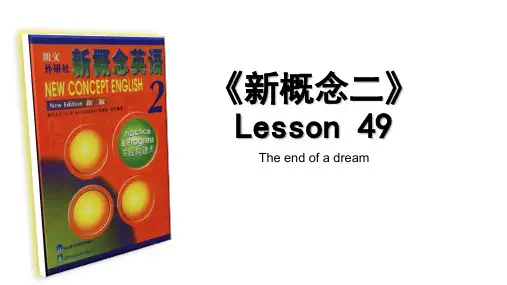
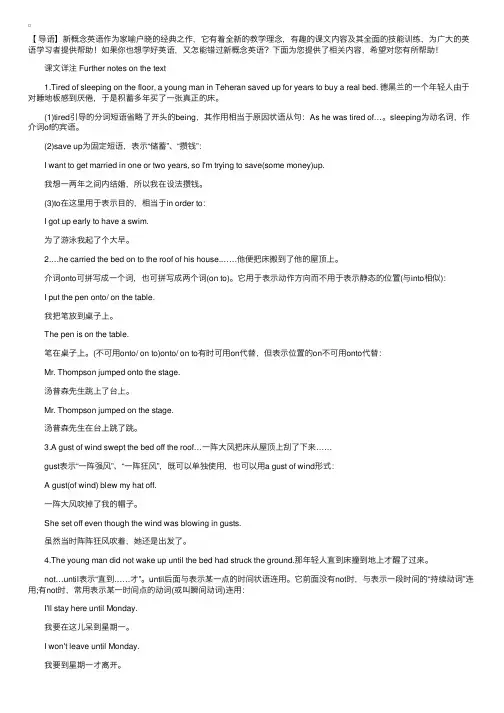
【导语】新概念英语作为家喻户晓的经典之作,它有着全新的教学理念,有趣的课⽂内容及其全⾯的技能训练,为⼴⼤的英语学习者提供帮助!如果你也想学好英语,⼜怎能错过新概念英语?下⾯为您提供了相关内容,希望对您有所帮助! 课⽂详注 Further notes on the text 1.Tired of sleeping on the floor, a young man in Teheran saved up for years to buy a real bed. 德⿊兰的⼀个年轻⼈由于对睡地板感到厌倦,于是积蓄多年买了⼀张真正的床。
(1)tired引导的分词短语省略了开头的being,其作⽤相当于原因状语从句:As he was tired of…。
sleeping为动名词,作介词of的宾语。
(2)save up为固定短语,表⽰“储蓄”、“攒钱”: I want to get married in one or two years, so I'm trying to save(some money)up. 我想⼀两年之间内结婚,所以我在设法攒钱。
(3)to在这⾥⽤于表⽰⽬的,相当于in order to: I got up early to have a swim. 为了游泳我起了个⼤早。
2.…he carried the bed on to the roof of his house.……他便把床搬到了他的屋顶上。
介词onto可拼写成⼀个词,也可拼写成两个词(on to)。
它⽤于表⽰动作⽅向⽽不⽤于表⽰静态的位置(与into相似): I put the pen onto/ on the table. 我把笔放到桌⼦上。
The pen is on the table. 笔在桌⼦上。
(不可⽤onto/ on to)onto/ on to有时可⽤on代替,但表⽰位置的on不可⽤onto代替: Mr. Thompson jumped onto the stage. 汤普森先⽣跳上了台上。
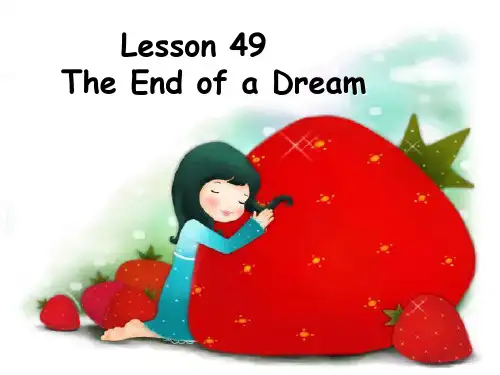
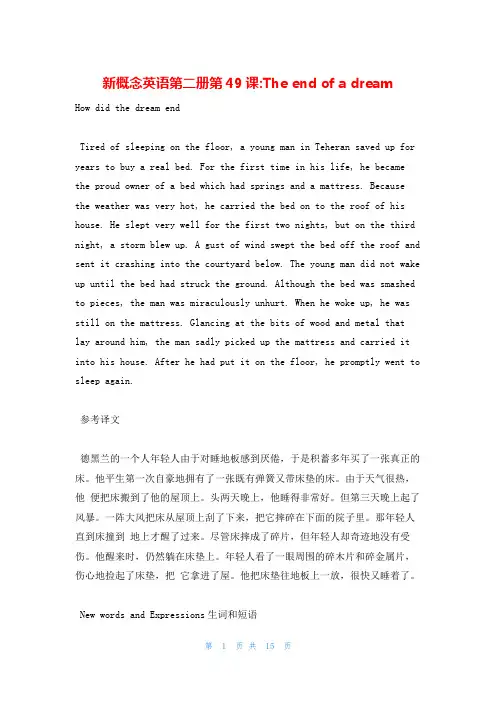
新概念英语第二册第49课:The end of a dreamHow did the dream endTired of sleeping on the floor, a young man in Teheran saved up for years to buy a real bed. For the first time in his life, he became the proud owner of a bed which had springs and a mattress. Because the weather was very hot, he carried the bed on to the roof of his house. He slept very well for the first two nights, but on the third night, a storm blew up. A gust of wind swept the bed off the roof and sent it crashing into the courtyard below. The young man did not wake up until the bed had struck the ground. Although the bed was smashed to pieces, the man was miraculously unhurt. When he woke up, he was still on the mattress. Glancing at the bits of wood and metal that lay around him, the man sadly picked up the mattress and carried it into his house. After he had put it on the floor, he promptly went to sleep again.参考译文德黑兰的一个人年轻人由于对睡地板感到厌倦,于是积蓄多年买了一张真正的床。
Lesson 49 The end of a dream 美梦告终How did the dream end?Tired of sleeping on the floor, a young man in Teheran saved up for years to buy a real bed. For the first time in his life, he became the proud owner of a bed which had springs and a mattress. Because the weather was very hot, he carried the bed on to the roof of his house. He slept very well for the first two nights, but on the third night, a storm blew up. A gust of wind swept the bed off the roof and sent it crashing into the courtyard below. The young man did not wake up until the bed had struck the ground. Although the bed was smashed to pieces, the man was miraculously unhurt. When he woke up, he was still on the mattress. Glancing at the bits of wood and metal that lay around him, the man sadly picked up the mattress and carried it into his house. After he had put it on the floor,he promptly went to sleep again.参考译文德黑兰的一个人年轻人由于对睡地板感到厌倦,于是积蓄多年买了一张真正的床。
新概念英语单词第⼆册第49课:美梦告终新概念英语单词第⼆册第49课:美梦告终 tired [ta??d] 厌烦的【单词扩充】weary厌烦的【单词搭配】be tired of厌倦【单词例句】A: I'm tired of my job.A:我厌烦了我的⼯作。
B: You can change it for another one then.B:那你能够换⼀份⼯作啊。
real [ri?l] adj.真正的owner ['??n?] 主⼈spring [spr??] 弹簧【单词例句】A: The mattress is made of spring wiresA:这个床垫是⽤弹簧做的。
B:How is the quality?B:质量怎么样?mattress ['m?tr?s] 床垫【单词扩充】cushion垫⼦【单词例句】A: He kept his bankbooks under his mattress.A:他将他的存折藏在了床垫底下。
B:How do you know that?B:你是怎么知道的?gust [g?st] ⼀阵狂风sweep [swi?p] (swept ,sweptl,swept) v.扫,刮【单词例句】A: Please sweep the floor when I'm doingthe washing. A:我洗⾐服的时候你把地扫扫。
B: But I'm watching TV now.B:可我正在看电视呢。
courtyard ['k??tjɑ?d] 院⼦【单词例句】There is a tall tree in our courtyard.我们院⼦⾥有⼀棵极⼤的树。
【单词扩充】compound院⼦smash [sm??] 碰碎,摔碎【派⽣词】smashing猛烈的【单词扩充】smash sth.down击倒某物【单词例句】A: Oh, what happened to my bike?A:噢,我的⾃⾏车怎么了?B: I'm really sorry. It got smashed by a truck.B:我⾮常抱歉,⾃⾏车给卡车撞坏了。
逐句精讲新概念英语第二册:第49课美
梦告终
Lesson49课 The end of a dream
新概念英语第二册课文内容:
Tired of sleeping on the floor, a young man in Teheran saved up for years to buy a real bed. For the first time in his life, he became the proud owner of a bed which had springs and a mattress. Because the weather was very hot, he carried the bed on to the roof of his house. He slept very well for the first two nights, but on the third night, a storm blew up. A gust of wind swept the bed off the roof and sent it crashing into the courtyard below. The young man did not wake up until the bed had struck the ground. Although the bed was smashed to pieces, the man was miraculously unhurt. When he woke up, he was still on the mattress. Glancing at the bits of wood and metal that lay around him, the man sadly picked up the mattress and carried it into his house. After he? had put it on the floor, he promptly went to sleep again.
本文语法:复合句的灵活应用
一句话总结:复合句由一个主句和一个或一+以上的从句构成。
主句是全句的主体,通常可以单独存在;从句则是一个句子成分,不能独立存在3 常见的从句及从句引导词主要有:
定语从句:who,which,that,whom, whose, where, when, why
宾语从句:that, where, what,why
让步状语从句:though, although, even if, even though
原因状语从句:because, as, for,since
条件状ift从句:I suppose, supposing, provided, so long as
时间状i許从句:until, after, before,as soon as
结果状语从句:so…that..., such...that...
目的状语从句:so that,in order that
比较状语从句:(not) so-..as..., (not) as…as…
同位语从句:that,when,where,what
新概念英语第二册逐句精讲笔记:
1、Tired of sleeping on the floor, a young man in Teheran saved up for years to buy a real bed.
德黑兰的一个年轻人因为对睡地板感到厌倦,于是积蓄多年买了一张真正的床。
语言点1 句首的形容词短语tired of...作状语,补充完整后形容词短语可以改为一个原因状语从句: Since / because he was tired of sleeping on the floor, a young man....
语言点2 to buy a real bed作目的状语。
2、For the first time in his life, he became the proud owner of a bed which had springs and a mattress.
他平生第一次自豪地拥有了一张既有弹簧又带床整的床。
语言点1 which引导的定语从句对bed进行修饰限定。
语言点2 表示“第几次”常常使用介词for:
for the first (second, third...) time 第一(二、三 )次;for the last / final time 最后一次
3、Because the weather was very hot, he carried the bed on to the roof of his house.
由于天气很炎热,他便把床搬到了他的屋顶上。
语言点1 本句because引导原因状语从句。
语言点2 cany sth. on to把某物带到……上去
4、He slept very well for the first two nights, but on the third night, a storm blew up.
头两天晚上,他睡得非常好。
但第三天晚上起了风暴。
语言点1 序数词放在基数词前面表示“前……个”或“后……个”:
for the first two nights 头两天夜里;for the first few days 在开始的几天里
语言点2 blow up意为“形成”:A storm blew up.风暴驟起。
5、A gust of wind swept the bed off the roof and sent it crashing into the courtyard below.
一阵大风把床从屋顶上刮了下来,把它摔碎在下面的院子皇
语言点1 sweep sth. off somewhere把某物从某处刮下来
语言点2 crashing into the courtyard below是现在分词作宾语it的补足语。
6、The young man did not wake up until the bed had struck the ground.
那年轻人直到床撞到地上才醒了过来。
语言点这是一个典型的“not...until...”句式结构,应译为“直到……才”:
Last night I did not go to bed until I finished the writing.
昨晚,我直到完成了写作才去睡觉。
7、Although the bed was smashed to pieces,the man was miraculously unhurt.
尽管床摔成了碎片,但年轻人却奇迹般地没有受伤。
语言点本句although弓|导让步状语从句。
初学者一定牢记:在让步状语从句中although 远不与but同时出现,这与汉语中“尽管……但是……”-的表达截然不同。
原句还可以改为:
The bed was smashed to pieces, but the man was miraculously unhurt.
8、When he woke up, he was still on the mattress.
在他醒来时,他仍然躺在床垫上。
语言点人位于床上,与床有接触面,所以用介词on。